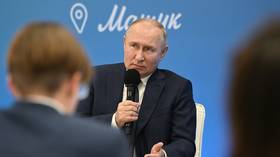Putin backs teaching Chinese in Russian schools

Russia should expand the study of Chinese and other Asian languages in the country's education institutions, given the continent’s growth in importance to world affairs, President Vladimir Putin said on Friday.
“Given the pace of development of Asian countries, the center of economic and political life will gradually shift to these regions,” Putin told a group of 30 high-achieving students at an event in Moscow marking the start of a new academic year, calling it “an absolutely objective, inevitable process.”
With that in mind, he added, it would be good for Russian students to learn Chinese and other Asian languages, while not neglecting “other vectors of interaction” with the world.
Setting that up will not be a quick process, the president cautioned, as it requires both funding and qualified teachers.
“But we will do this, relying on foundations built in the past, because Oriental studies in the Soviet Union and now in Russia have always been at a high level, as all our colleagues working in this field have recognized,” Putin said.
The president’s adviser for science and culture, Andrey Fursenko, said earlier this week that Russian universities should gradually introduce Chinese language courses in order to stay abreast of scientific developments.
“Do we want to keep pace with science?” Fursenko asked, noting that 30% of all scientific papers were in Chinese at this point. “We won’t force it on anyone, but we need to move in this direction if we wish to remain competitive.”
Fursenko noted that the Moscow Institute of Physics and Technology (MFTI) recently attempted to introduce Chinese as the second mandatory foreign language, but ran into “fierce opposition” from the students.
Russia, China, and India are all members of the BRICS group, which will expand in January to include Argentina, Egypt, Ethiopia, Iran, Saudi Arabia, and the United Arab Emirates as well. Moscow and Beijing also have very strong bilateral ties and have publicly stated a joint commitment to building a more just, multipolar world order.













